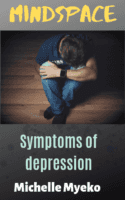Depression as a medical condition is misunderstood. The illness is surrounded by great stigma because our society stays silent about mental health issues. There is a perception that sustained sadness sometimes without an outside cause is merely imaginary.
I considered writing a technical, well-researched article about symptoms to look out for if you suspect yourself of having depression. I will do that for sure, because that is valuable. But, because depression affects how you feel, how you view yourself and the world, I will write mostly about what depression sometimes feels like.
Depression is defined as feelings of severe despondency and dejection caused by a chemical imbalance of serotonin, or sometimes loss. There are several signs to watch out for when suspecting this very real medical condition. These are:
• Loss of interest in activities you found enjoyable before.
• Fatigue and lack of vitality.
• Changes in sleeping habits, either sleeping too long without gaining rest or struggling to fall asleep because of racing thoughts.
• Changes in eating habits, loss of appetite or over-indulging in food.
• Feelings of great sadness accompanied by hopelessness.
• Imagining suicide.
This is also what depression is:
Depression is sometimes calling in sick at work, telling your boss you have a cold or tonsillitis because you know that the workplace cannot accept you calling in sad.
Depression is sometimes seeing pictures of friends gathered socially, without you. Seeing this and feeling hurt, even though you know that you refused the previous six invites, and, that if you are completely honest, you would not have made it to this either – but not being invited still feels like being left to your sadness.
Depression is sometimes watching your dirty clothes pile up in the chair in your bedroom. It is watching all the clean clothes move from the wardrobe, to your body, to the chair. Completely bypassing the washing machine or the washing basin, depression is sometimes having to sniff the clothes on the chair in order to determine whether you can still wear them. Depression is not having the strength to do your laundry, and then berating yourself for the physical mess that reflects your state of mind.
Depression is the sinking feeling you get when you have to answer the question, “How are you?” With the expected response of “I’m fine”, even though you want to scream, “I’m drowning, help me please.”
Depression is knowing that you are too sad to live but too afraid to die.
Depression is sometimes having just enough energy to go to work and then return to commit to your bed, unable to face the world or your feelings. Aching for the oblivion that comes with sleep.
Depression is sometimes giving yourself a pep talk, telling yourself to pull yourself together, counting your blessings and then feeling momentarily better, only to have ONE thing go wrong, just one, then having all the sadness come back tenfold.
Depression is the isolation you feel when you are deeply sad for extended periods over a sorrow you cannot name.
Depression sometimes is having constant thoughts of wanting to end it all, of feeling a hopelessness that tells you that all your joys are in your past and all your sorrows wait for you in the future.
Depression is sometimes the inability to be an effective adult, when really simple things become complex and prove hard to do. Depression can look a lot like laziness because normal chores like washing the dishes and sweeping the floor suddenly feel like attempting to climb Mt Kilimanjaro on one leg. You watch the dishes pile up, hating yourself for not having the strength to tackle them.
Depression is sometimes the loneliness you feel, craving human contact, wanting to be speak and to be listened to by someone who cares, and then letting the phone ring unanswered because your sadness does not care about your feelings of isolation, it demands your full attention.
Depression is sometimes googling ways to end it painlessly, it is watching the news and seeing unrest in faraway countries where bombs are dropped in houses and being jealous, wishing that you were also in the warzone so you would not have to take your own life.
If any of the things you have read seems familiar, please contact your doctor or local clinic, or call the numbers below. There is help at hand. There are people you can speak to, medications you can take to save your life. Depression is as real as cancer and can be just as deadly.
And remember: when you are in darkness, it is hard to imagine the light. But it is still there, and can come back to your life. Look after yourself. Look for help. You’re worth it. You are not alone. Others have gone through the tunnel, and come out the other end.
I have learnt these lessons. I have to re-learn them sometimes. But they are always true.
If you would like to speak to someone, people are waiting to take your call:
South African Depression and Anxiety Group 0800 567 567
Suicide Crisis Helpline: 0800 12 13 14
Tell us: how can we be more supportive of those who have depression?



